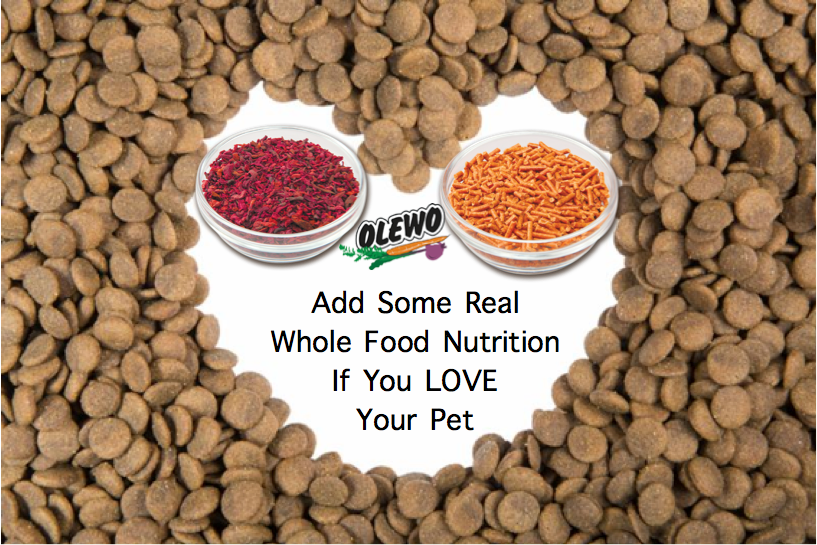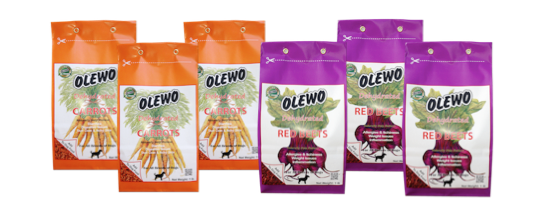Dogs eating commercial food are like people eating fast food, there simply isn’t enough nutrition in processed foods to thrive and help prevent disease.
Doesn’t it seem strange that in this era of improved nutrition and better medical care, dogs are living shorter lives?
Since commercial, processed pet foods were introduced in the late 1950’s, there has been an increase in health issues in dogs linked to nutritional deficiencies. When dogs became domesticated, they were fed table scraps or meals made especially for them of human grade food. Dogs were healthier as a whole at that time compared to the present day. My father remembers all too well that when he grew up on his parent’s farm, they had several larger dogs that his mother cooked for, or they received table scraps. He remembers that those dogs lived well into their mid 20’s. Today the average life span of a large breed dog like a German Shepherd or Labrador is only 10 to 12 years.
Do you think there is a link between diet and disease? I certainly do, and I know more and more pet owners are starting to realize that and are seeking out healthier choices when it comes to feeding their pets.
THE HISTORY OF COMMERCIAL DOG FOOD
I like to follow Karen Becker DVM, a proactive and integrative wellness veterinarian who believes that the foundation of good health has much to do with appropriate nutrition. She was named one of Chicago’s Top Ten Vets, according to Chicago Magazine, and has appeared on the hit show, the Animal Planet. She has now partnered with Dr. Joseph Mercola and provides education in the form of articles and YouTube videos on his animal wellness resource website HealthyPets.Mercola.com.
In one of her articles The Best “Pet” Food Money can Buy … And the Absolute Worst she provides this summary of the history of commercially prepared pet foods in the US:
The Great Depression of the 1930s and early ’40s had a significant impact on the growth of the commercial pet food market; however, lack of industry regulation invited anyone who wanted to make a buck to produce a can or bag of pet food. During that period, canned pet food accounted for over 90 percent of the market.
During World War II (1939 to 1945), not only was metal rationed, but also pet food was categorized as “non-essential” by the U.S. government. The combination spelled death for the canned pet food industry.
The war also sparked the processed food revolution in the U.S, and all the factors that made processed food attractive to humans ultimately had a significant impact on the pet food industry as well.
In the late 1950s, a U.S. pet food company developed a way to create kibble from boiling cauldrons of meat, fat and grain scraps – it’s called extrusion. The raw materials are purchased by pet food manufacturers who then blend the rendered fat and meat with starch fillers. They add bulk vitamin and mineral supplements, and then they extrude the mix at high temperatures, creating all sorts of toxic reactions. This is what passes for pet food and it’s sold to consumers at a tremendous profit.
By 1960 there were many, and today there are hundreds of companies mass-marketing kibble. Carnivorous pets have not evolved to digest and assimilate foods like corn, wheat, rice or potatoes – yet these are the very foods the vast majority of pet food manufacturers use as primary ingredients in their formulas.
Fortunately, dogs are extremely resilient creatures. Not only do they not die immediately upon eating biologically inappropriate foods, but it often takes years before the significant physical degeneration that occurs from a lifetime of eating the wrong foods becomes noticeable.
Dr. Becker writes that for over a half-century, our pets have been fed inappropriate diets that have kept them alive, but not thriving. In fact, she says, we’ve created dozens of generations of animals that suffer from degenerative diseases linked to nutritional deficiencies.
Dr. Becker closes her article by saying that dogs need QUALITY PROTEIN, FATS, and a small amount of VEGETABLES and FRUITS, which provide antioxidants and fiber to animals that no longer hunt whole prey. NATURAL SOURCES of trace minerals, vitamins, and fatty acids must be added, since the soils in which foods are grown are depleted of many of the nutrients pets need. Pets need unadulterated, fresh, WHOLE FOODS that are moisture dense. They don’t need grains, fillers, artificial preservatives, colors, additives, chemicals, byproducts, or processed foods. Although animals can eat some processed foods, they aren’t designed to consume a lifetime of dry or canned diets.
Dr. Becker calls it unfortunate that the American pet owner’s love of dry pet food has endured since it was first introduced.
In her opinion, this is what led pet food companies to mass-market this type of pet food that is most popular with U.S. pet owners due to its convenience and low cost. Pet food companies capitalize on the popularity of kibble. And she is wondering … have we chosen convenience over the health of our pets?
She says one of the reasons we’re able to deceive ourselves into believing convenience pet foods are good for dogs is because the changes to a pet’s health and vitality brought on by a dead, processed diet are usually not immediate or acute.
If you are feeding commercial dog food, I suggest avoid buying from the big-brand dog food companies because their foods may not contain the wholesome, healthy ingredients you want for your dog.
According to the Whole Dog Journal, what these big companies do best isn’t making quality food – its marketing and advertising. The truth is that these mega corporations can’t find enough high-quality ingredients to meet their ridiculously huge production volumes.
The big companies spend more money on packaging, processing and promoting their products than on quality ingredients to support health. So don’t be fooled by the pretty pictures and the advertisements of the big-brand dog food companies that make the food seem better than it is.
It’s important that each food you choose is free of artificial preservatives, corn, wheat, soy or dyes. Read the ingredient labels. An artificial preservative would be listed as BHA, BHT or ethoxyquin. There are reports that BHA and BHT are carcinogenic (Cancer Lett 1987 Fukushima et al), while ethoxyquin, a preservative and pesticide, is reported to damage kidney tissue in rats (Arch Toxicol. 1992 Manson et al). Corn and soy, unless stated, are of genetically modified origin, while wheat is high in gluten. These undesirable ingredients can contribute to allergies, inflammatory bowel disease or even cancer.
ADDING WHOLE FOOD VITAMINS
Many kibble manufacturers state that you shouldn’t add vitamins or supplements to their food, claiming that their food is complete and balanced. In reality, the laboratory derived, synthetic vitamins present in the food don’t meet adequate standards. Over time, cell receptors can become clogged with these fake vitamins and begin to perform improperly. In fact, toxicity can occur if synthetic vitamins are excessive in the food.
WHOLE FOOD VITAMINS are complex and better used by the body’s cells and the assimilation of these healthful vitamins can actually be decreased when in the presence of synthetic vitamins. Minimizing synthetic vitamins and adding whole food vitamins will give the body the opportunity to pick and choose what it needs.
OLEWO – THE PERFECT PARTNER FOR ANY PET FOOD
Olewo Carrots and Olewo Red Beets are easily added to kibble or whatever food you are feeding. Simply rehydrate and mix in with your dog’s meals.
With just one spoonful of Olewo a day, you can pack a TON of WHOLE FOOD VITAMINS into your dogs’ meals to supercharge their health. PLUS, because Olewo properly prepared the vegetables to be easy for your dogs’ bodies to digest, you know they are able to absorb and utilize the amazing nutrients.



